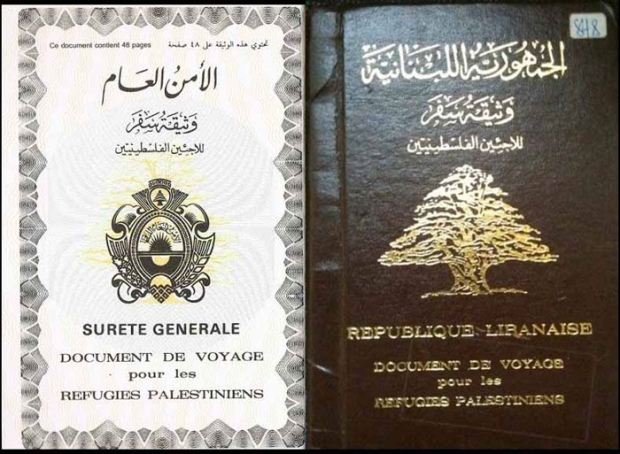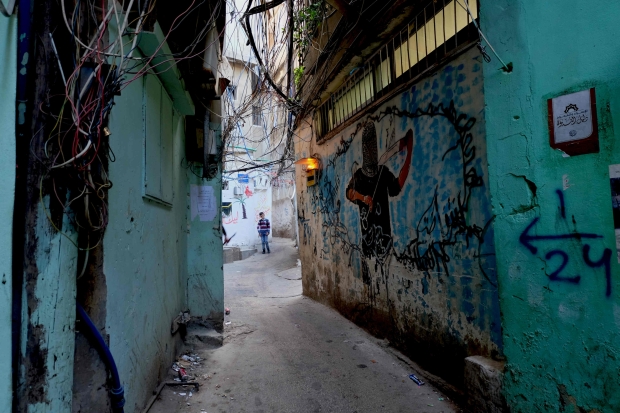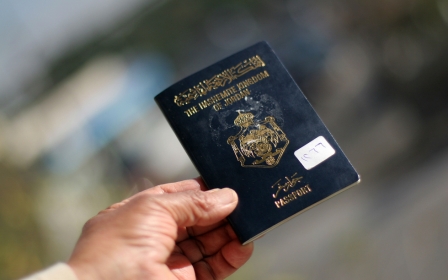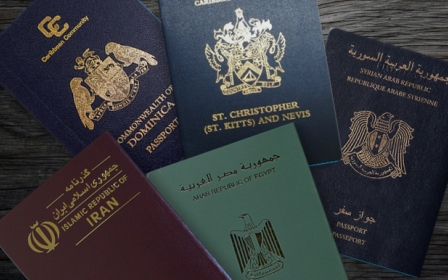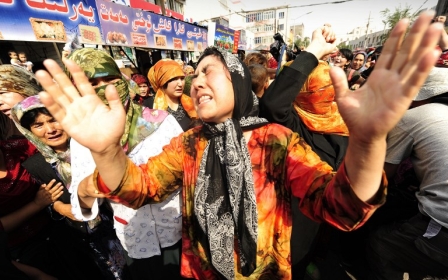EXCLUSIVE: Saudi Arabia bars Palestinian refugees in Lebanon from visiting Mecca
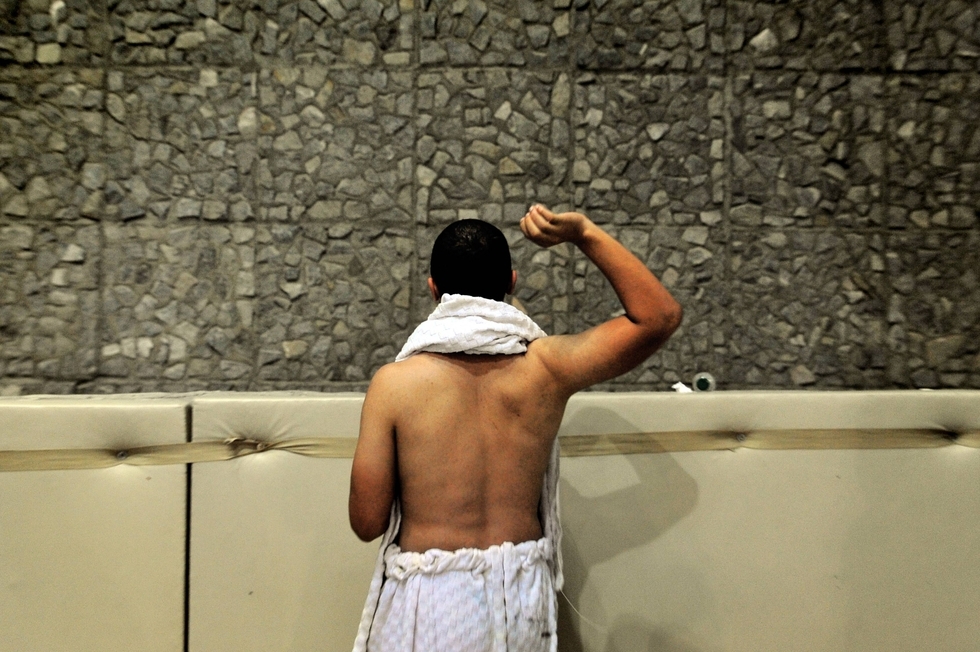
Saudi Arabia has stopped issuing pilgrimage visas for Palestinians in Lebanon who hold refugee travel documents, effectively barring tens of thousands of Palestinians from visiting Mecca and Medina, the two most important religious sites for Muslims, Middle East Eye can reveal.
An official at the Saudi consul's office in Beirut confirmed to MEE that following a decision by the Saudi Foreign Ministry in Riyadh, they had informed tourism companies in Lebanon that no Hajj and Umrah visas would be issued to Palestinians on their refugee travel documents - a decision that became effective on 12 September.
"The Palestinian refugees [in Lebanon] can now get visas on a Palestinian Authority passport," the official said.
"There are Palestinians who already applied for Umrah visas on their PA passports after the decision was made and they got visas to travel [to Saudi Arabia]. I do not have an exact number for them," the official added.
The official said that the Saudi Foreign Ministry had informed the occupied West Bank-based PA of its decision.
It is not true that we will issue Palestinian passports for any refugee in Lebanon to get a visa for Umrah or any other sort of visa. The PA did not issue a decision to issue passports for Palestinians in any Arab states
- Ashraf Dabbour, PA ambassador to Beirut
Ashraf Dabbour, the Palestinian Authority ambassador in Beirut told MEE that the embassy knew about the Saudi visa decision through unofficial channels by word of mouth from Palestinian local figures.
But he denied that the PA would issue travel documents for refugees in Lebanon wishing to travel to Saudi Arabia.
"It is not true that we will issue Palestinian passports for any refugee in Lebanon to get a visa for Umrah or any other sort of visa. The PA did not issue a decision to issue passports for Palestinians in any Arab states," Dabbour told MEE.
Dabbour said that the Palestinian embassy was "surprised" by the Saudi decision and that it was "solving this matter" with the Saudi embassy in Beirut, as well as through the Palestinian ambassador in Riyadh, Basem Abdullah al-Agha, who he said has been in contact with the Saudi Foreign Ministry.
Palestinian refugees in Lebanon are estimated to number 174,422, according to the country's first and only census of the community in December last year.
They hold refugee travel documents issued by Lebanon's General Directorate of the General Security and currently have no access to any other form of travel documents allowing them to go to Saudi Arabia.
They could apply for a Lebanese travel document that is valid for one, three or five years, and the application fees are similar to that of the Lebanese passport, which costs $40 for each valid year.
They are also prohibited from practising 20 professions including law, medicine and engineering, and are not allowed to work in government institutions because they are designated as "foreigners" under Lebanese law.
The Lebanese political system is based on a sectarian structure dividing power among the main religious communities.
While a number of Christian Palestinians who fled to Lebanon in the wake of the creation of the state of Israel and the Nakba in 1948 were granted Lebanese citizenship, Lebanon has been particularly reluctant to integrate Palestinian refugees and alter its population's already tense confessional makeup.
The PA's Dabbour said that the Palestinian embassy in Lebanon had previously issued PA passports for undocumented Palestinians in Lebanon, known also as non-ID refugees, whose numbers are estimated at around 5,000, to facilitate their travel abroad and obtain visas and residency in other foreign countries.
"This is a particular case in which we issued Palestinian passports because those non-ID refugees were not registered with the UNRWA nor the Lebanese state, and they could not travel anywhere," Dabbour explained.
The Palestinian embassy has not yet issued a statement regarding the outcome of its talks with Saudi officials.
Saudi Arabia is one of the funders of the Palestinian Authority, and it uses its financial leverage to put political pressure on the PA. In 2017, the kingdom contributed $92.1m to the budget of the PA - a nearly 50 percent decrease from its $180m contribution a year earlier.
'It is not practical'
Speaking to MEE, several Lebanese tourism companies confirmed that they have not been able to obtain visas for their Palestinian clients who hold refugee travel documents.
The decision was conveyed to them by the Saudi consulate through the Lebanese Committee for Hajj and Umrah Affairs. Ibrahim Itani, the director of the committee, told MEE that the Saudi consul, Palestinian ambassador and the Lebanese General Security all confirmed to him that Palestinian refugees needed Palestinian Authority passports to enter Saudi Arabia.
Itani was asked by several tourist companies to speak with the Saudi embassy to see if the decision could be reverted.
"The case is now with Abu Mazen," Itani told MEE, referring to PA President Mahmoud Abbas. "I have been told that this is an issue between states, that was the answer."
An owner of a Hajj and Umrah travel office in the southern Lebanese city of Saida, who wished to remain anonymous, told MEE that the Saudi decision was "not practical," and they were looking for the cancellation of this decision.
"If you issue a Palestinian passport, you then need to apply for a residency in Lebanon and this is another problem for Palestinian refugees," he said. "You could then apply for a visa for Saudi Arabia, but then the refugee travel document will become void."
Palestinian refugee problem
MEE reported in September that Saudi Arabia had banned Palestinians holding temporary Jordanian passports from entering the country, a measure directly affecting almost 634,000 Palestinians living in Jordan and Israeli-occupied East Jerusalem.
Several travel agents who spoke to MEE at the time said they had been told at the start of September that they should not apply for visas for anyone seeking to travel on a temporary Jordanian passport, although no official Saudi announcement had been made.
The Jordanian temporary passport is a document valid for five years issued to Palestinians who live in occupied East Jerusalem by the Civil Status and Passports Department in Amman.
The holders of temporary passports do not have a national identification number and are therefore not entitled to the full rights of Jordanian citizenship.
Palestinians living in East Jerusalem use the passport merely as a travel document to move from one country to another, especially in the majority of Arab states that do not recognise Israel or Israeli-issued travel documents.
Some Palestinian and Arab media have linked the Saudi move to US President Donald Trump's as-yet-unannounced "deal of the century" proposal, amid rumours that Washington sought Saudi support for measures that would revoke the right of return of Palestinian refugees displaced by the creation of Israel in 1948 and subsequent Arab-Israeli wars.
The measures would see Palestinian refugees in Lebanon and Jordan fully naturalised and granted national ID numbers.
Israel Katz, Israel's minister of transport, tweeted on 11 September welcoming Trump's "initiative" regarding the issue of Palestinian refugees, saying that the Palestinian refugee "problem" in Jordan, Syria, Lebanon, and Iraq "would be good to disappear from the world".
MEE could not confirm if Katz's tweet was related to Saudi Arabia's new restrictions on Palestinian refugee and temporary travel documents.
This article is available in French on Middle East Eye French edition.
New MEE newsletter: Jerusalem Dispatch
Sign up to get the latest insights and analysis on Israel-Palestine, alongside Turkey Unpacked and other MEE newsletters
Middle East Eye delivers independent and unrivalled coverage and analysis of the Middle East, North Africa and beyond. To learn more about republishing this content and the associated fees, please fill out this form. More about MEE can be found here.


